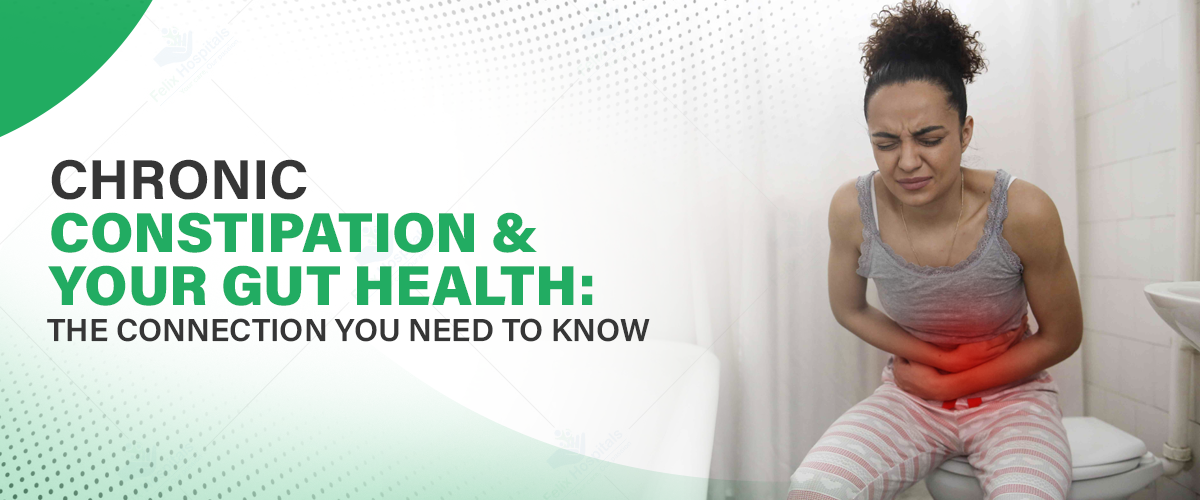
Subscribe to our

Chronic constipation is a condition that can significantly impact daily life, leading to discomfort, pain, and even embarrassment. For many, it can become a persistent problem that affects not only their physical well-being but also their mental health and quality of life. In recent years, there has been a growing awareness of the connection between gut health and constipation. The health of your digestive system plays a pivotal role in managing and relieving this condition. For effective management, it’s crucial to explore how gut health influences constipation and how you can take steps to improve it. If you're seeking expert care, visiting the best gastro hospital for guidance and treatment could be a great first step.
Don’t let chronic constipation affect your quality of life. Contact us today by Calling +91 9667064100!
Chronic constipation refers to infrequent, painful bowel movements that occur for an extended period. It is characterized by fewer than three bowel movements per week, often accompanied by straining, discomfort, and a feeling of incomplete evacuation. Unlike occasional constipation, which is usually short-lived and often linked to diet or temporary lifestyle factors, chronic constipation persists over months or years and may require professional treatment.
Symptoms include:
Understanding gut health and constipation's underlying causes, such as diet, stress, and gut health, is crucial for effective management.
Gut health plays a fundamental role in the proper functioning of your digestive system. The gut microbiome, which is the community of trillions of bacteria, fungi, and other microorganisms living in your intestines, helps break down food, absorb nutrients, and regulate bowel movements. A balanced microbiome is essential for optimal digestion and overall health.
An imbalance in this delicate ecosystem—also known as gut dysbiosis—can contribute to chronic constipation. When harmful bacteria outnumber the beneficial ones, digestive issues such as constipation, bloating, and irregular bowel movements may occur.
Poor gut health, caused by factors such as an unhealthy diet, stress, and sedentary lifestyles, can lead to digestive issues. For instance:
When the gut microbiome becomes imbalanced (dysbiosis), the process of breaking down food and absorbing nutrients is compromised. This imbalance can cause slower digestion, leading to constipation.
Probiotics are live microorganisms that provide health benefits, especially for gut health and Constipation. They help restore balance to the gut microbiome and are commonly found in fermented foods such as yogurt, kefir, and sauerkraut.
Probiotic supplements may also be beneficial for relieving constipation. By promoting a healthy balance of good bacteria, probiotics can improve digestion and bowel movements. If you’re considering probiotics for chronic constipation, it’s important to consult with a healthcare professional to determine the best course of action.
Consulting a gastroenterologist or visiting a specialized constipation hospital can provide personalized care and help diagnose any underlying issues contributing to chronic constipation. Professional treatment is essential for managing and relieving symptoms effectively.
Prioritize your gut health and take the first step toward relief by consulting with experts at Felix Hospitals. Schedule your appointment now!
The connection between gut health and chronic constipation is undeniable. Lifestyle changes such as improving your diet, staying hydrated, exercising, and managing stress can significantly improve your gut health and find relief from constipation. If symptoms persist, seeking professional help from a healthcare provider or the best gastro hospital is crucial. Taking steps to improve your gut health helps with constipation and supports overall well-being.
1. What is the main cause of chronic constipation?
Ans: Chronic constipation is often caused by a combination of factors, including a low-fiber diet, inadequate hydration, lack of physical activity, and poor gut health. In some cases, underlying medical conditions like hypothyroidism or irritable bowel syndrome (IBS) may also play a role.
2. How does gut health influence constipation?
Ans: Gut health, particularly the balance of good and bad bacteria in your microbiome, plays a critical role in digestion. Imbalances in this ecosystem can slow digestion, harden stools, and contribute to chronic constipation.
3. What foods should I avoid if I have chronic constipation?
Ans: Avoid processed foods, high-fat dairy products, red meat, and refined grains, as they can slow digestion and worsen constipation. Instead, focus on high-fiber and whole foods to support gut health.
4. Can stress worsen constipation?
Ans: Yes, stress impacts the gut-brain connection, slowing digestion and disrupting bowel movements. Chronic stress can exacerbate constipation by causing changes in gut motility and microbiome balance.
5. Are probiotics effective for chronic constipation?
Ans: Probiotics can help by restoring balance to your gut microbiome, improving digestion, and easing bowel movements. However, their effectiveness may vary, so it’s best to consult a healthcare provider for tailored advice.
6. How much water should I drink to prevent constipation?
Ans: Most adults should aim for at least 8–10 cups of water per day, though individual needs may vary. Staying hydrated softens stools and promotes regular bowel movements.